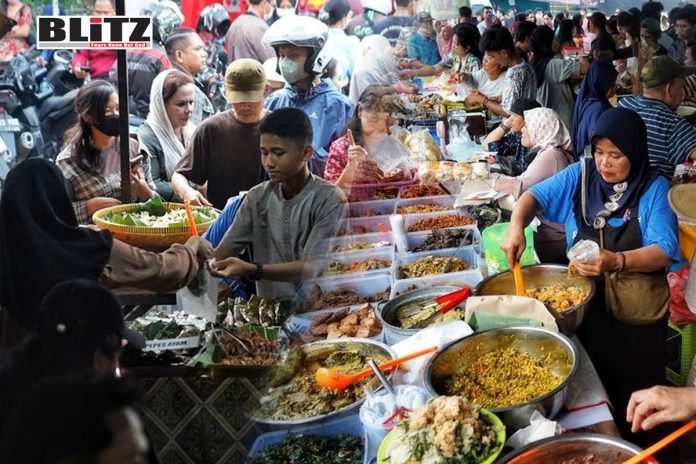In the vibrant tapestry of Indonesia’s cultural landscape, the phenomenon of the Takjil War stands as a testament to the nation’s rich diversity and democratic ethos. This unique social phenomenon, characterized by the spirited pursuit of food during the sacred hours leading up to the breaking of the fast during Ramadan, transcends religious boundaries and embodies the inclusive spirit of Indonesia’s democracy. In this comprehensive exploration, we delve into the origins, significance, and broader implications of the Takjil War, shedding light on its role in fostering unity amidst diversity.
The term “Takjil War” finds its roots in the amalgamation of “Takjil,” signifying the hastening of breaking the fast, and “War,” emblematic of the collective zeal and spirited competition surrounding this gastronomic tradition. Traditionally, Takjil encompasses an array of appetizers savored to break the fast, ranging from cherished classics like Kolak and Kurma to contemporary delights such as Agar-agar and Klepon. However, the Takjil War transcends mere culinary enjoyment, evolving into a communal endeavor that transcends religious boundaries and nurtures social harmony.
Fueled by the pervasive influence of social media platforms like Instagram, TikTok, and Facebook, the Takjil War has emerged as a cultural phenomenon, capturing the imagination of Indonesians from diverse religious and cultural backgrounds. From the resonant call of the bedug echoing through mosques to the jubilant proclamations in churches, the Takjil War has morphed into a unifying phenomenon, symbolizing Indonesia’s ethos of pluralism and tolerance. It serves as a testament to the nation’s ability to celebrate its diversity while fostering bonds of camaraderie and understanding across religious divides.
Understanding the Takjil War phenomenon requires a nuanced grasp of how Islam has evolved uniquely within the Indonesian context. In contrast to Islam’s spread through conquest and coercion in other regions, Indonesia’s encounter with Islam was marked by peaceful assimilation and syncretism. This inclusive approach facilitated the harmonious fusion of indigenous traditions with Islamic teachings, resulting in a distinctively Indonesian expression of Islam that embraces cultural diversity and pluralism. Rather than imposing a rigid orthodoxy, Indonesian Islam embodies a spirit of tolerance and acceptance, reflecting the nation’s rich tapestry of cultural influences.
Furthermore, Indonesia’s commitment to democratic principles and religious freedom has profoundly shaped its religious landscape. Anchored in the Pancasila ideology, which advocates for unity, diversity, and social justice, Indonesia’s democracy safeguards the rights of individuals to practice their faith without fear of persecution or discrimination. This inclusive framework fosters an environment of mutual respect and coexistence, where people of various religious backgrounds can thrive and contribute to the nation’s social fabric. By upholding pluralism and democratic values, Indonesia continues to serve as a beacon of religious tolerance and cultural diversity, setting an example for the world to emulate.
At its essence, the Takjil War epitomizes the essence of Indonesia’s democratic pluralism, symbolizing unity in the face of diversity. Regardless of their religious affiliations, Indonesians from diverse backgrounds unite during Ramadan to partake in the communal tradition of breaking the fast. This collective participation transcends religious barriers, fostering solidarity and strengthening the bonds of the nation. Such inclusive engagement not only enriches the cultural tapestry of Indonesian society but also underscores the nation’s unwavering commitment to democratic ideals.
Nevertheless, the Takjil War presents its own set of challenges. The enthusiastic involvement of non-Muslims in the Takjil hunt has occasionally resulted in shortages of Takjil for fasting Muslims. This disparity has prompted calls for fair distribution practices and heightened sensitivity to religious observances. Yet, these obstacles serve as opportunities for constructive dialogue and mutual understanding. They underscore the importance of upholding principles of tolerance and inclusivity within Indonesia’s democratic framework. By addressing these challenges with empathy and respect, Indonesians can further solidify the foundations of their diverse and pluralistic society.
As Indonesia eagerly anticipates the forthcoming Easter celebrations, Muslims across the nation are earnestly strategizing ways to reciprocate the goodwill experienced during the Takjil War. With social media abuzz with hints of participation in Easter festivities, there’s a palpable sense of fostering mutual respect and solidarity transcending religious boundaries.
The Takjil War phenomenon encapsulates Indonesia’s profound democratic pluralism and cultural dynamism. Amidst a global backdrop marred by strife and discord, Indonesia emerges as a beacon of hope, showcasing the harmonious coexistence of people from diverse faiths and backgrounds. The ongoing Takjil War serves as a poignant reminder of the enduring spirit of unity in diversity that lies at the heart of the Indonesian identity. Through a commitment to inclusivity and the celebration of cultural diversity, Indonesia paves the way towards a future brimming with brightness and equity for all its inhabitants.




